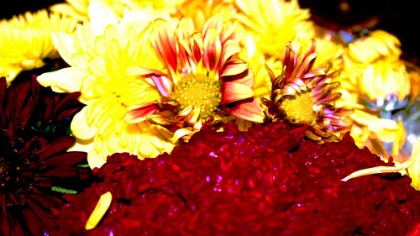Nepalese around the world celebrate Dashain with gusto as it brings communities and families together. But, lately this beloved holiday has been criticized for a number of reasons but mainly animal cruelty.
As goddess Durga is worshiped as symbol of power and also destroyer of evil, during Dashain animal sacrifice is practiced in temples across Nepal. The sacrifice symbolizes destruction of evil, and devotees hope that it pleases the goddess.
Last year, various groups organized rallies and public meetings urging people to stop sacrificing animals in name of religion. Global Voices covered this in a post titled Towards a More Humane Dashain Festival .
Unfortunately, the practice still continues and this year's Dashain festival too saw numerous animal sacrifices across the country.
Laura Goldman at Change.org suggests that devotees should “Sacrifice Pumpkins, Not Buffalo, During Nepal's Dashain Festival”:
“…Animal Welfare Network Nepal (AWNN) has a better idea for a kinder, gentler puja. Why not slaughter a pumpkin instead of a buffalo? A coconut instead of a goat? It would still get the point across, but be much more humane (and less gruesome).
The network began its Stop Animal Sacrifice campaign earlier this year during the Gadhimai festival in Bara, when 200,000 animals were sacrificed within the span of 24 hours.”
Some are also pointing to the scriptures and calling on devotees that animal sacrifice is not in accordance to the Hindu principles.
AnimalRights Nepal says that the goddess who is symbol of motherly love cannot be appeased by animal sacrifice, as she would be witnessing her own creatures being killed.
“According to Hindu religious texts regarding animal rights, nothing is mentioned of animal sacrifice to appease Gods and Goddesses, who would never approve their own creatures being slaughtered in their name. Human beings are killing those innocent creatures for their own selfish motive. It is against Hindu religion and way of life, in reality. The respect that must exist for fellow living creatures must be maintained.”
Interestingly, the debate over animal sacrifice during Dashain is a major issue only within Nepal. Nepalese celebrating Dashain overseas are mostly silent on this, mostly because practicing animal sacrifice outside Nepal-especially in Europe and North America is not part of Dashain celebrations.
In spite of controversy over animal sacrifice and growing international media attention over it, Dashain still hold a very special place in hearts and minds of Nepalese all around the world.
In Afghanistan, British Gurkha troops celebrated Dashain the traditional way, with customary tika (made from vermilion powder, yougurt and rice grains) and blessing from the elders.
“The Gurkhas set-up a small temple in each of their Patrol Bases for weekly worship and blessings. In August the Battalion Pundit (Hindu Chaplain) visited the Gurkhas in Nahr-e Saraj, holding temple services and blessing each soldier with a tikka (red dot on the
forehead).During the Dashain festival, offerings of fruit are placed in the temples and services held each morning for the soldiers. Many Gurkhas are seen with red tikkas during Dashain – blessings for safety and prosperity as they approach the end of their operational tour and
return home to their families.”
In culturally mixed families too, Dashain is celebrated with excitement. An American engaged to a Nepalese, writes in her blog AmericaNepali about the experience of observing the festival.
As with any religious observation, Dashain also comes with its own set of moral and ethical challenges, but we cannot ignore the immense joy and richness these observations bring to us while we deal with the challenges.









3 comments
I am agree with you but until and unless we don’t have best option our words doesn’t work. Its my personal views but i respect your words
Why don’t you make a similar case against KFC for killing hundreds of thousands of chickens everyday ???
People are right to celebrate the festival the way they want.
You should also do the same. Enjoy the festival and don’t be jealous at what others do…